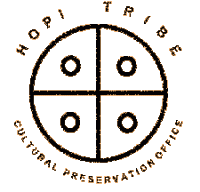Led by principal investigators Leigh J. Kuwanwisiwma, the Director of the Hopi Cultural Preservation Office (HCPO), and Justin B. Richland, Associate Professor of Anthropology at the University of Chicago, this study, which was recently approved by the IPinCH Steering Committee, will investigate how the HCPO manages Hopi cultural knowledge resources, given the differences between Hopi notions of navoti (‘traditional knowledge’) and Euro-American understandings of intellectual property.
The research team also includes Susan Secakuku, a Hopi consultant, and Stewart B. Koyiyumptewa, Archivist at the Hopi Cultural Preservation Office.
Hopi philosophy situates cultural knowledge as unique and sacred; no two Hopi villages will possess the same navoti. Nevertheless, the HCPO has established itself as the leading tribal institution policing the ways in which Hopi culture is represented and transmitted, sparking criticism from both Hopi and non-Hopi sources. As such, how are the concepts of navoti and ‘intellectual property’ deployed in the actual discourses and processes that constitute the central work of HCPO’s cultural management activities? This case study will focus on the issues of competing epistemological demands and the responses to them that sit at the very heart of the everyday practices of cultural heritage protection work.
At once historic and ethnographic, this study will draw on a methodology of archival research, oral history interviews, focus group interviews, and participant observation. Among other publications planned, this study will result in the development of an official Hopi Cultural Preservation Protocol and Manual, a practical guide for the HCPO and the Hopi Tribe to use as the basis for sustainable cultural heritage management into the foreseeable future. While this initiative will be an important contribution to the IPinCH project, it is hoped that the Hopi Nation and others will also benefit greatly from the knowledge and insights generated.






